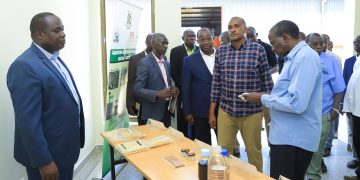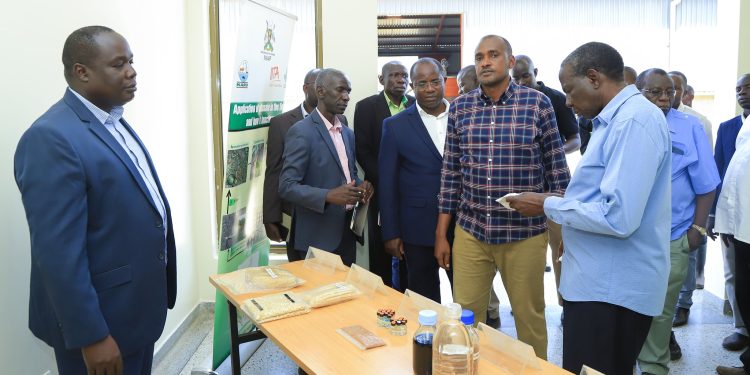Government has been tasked to increase the funding it is currently allocating to the agricultural research.
Dr Yona Baguma, the Deputy Director General of the National Agricultural Research Organisation (NARO), said research is among the most expensive things to do in the world, however it’s investment is worth it.
He requested government to provide sustainable funding for agricultural development and research with a funding of Shs300 billion annually if they are to meet the targets.
He noted that they are currently working on an anti-tick Vaccine which is in the trial stages, however, they need a funding of Shs 60 billion to set up phase 2 which includes machinery and production.
“In order to produce this vaccine, we request government to provide a special fund of 60 billion during the financial year 2023-2024 to support the research and production of this vaccine, which will benefit the farmers,” he said.
Baguma made the remarks during a visit at the NARO research institute of Nakyesasa by the Minister of Finance, Matia Kasaija and the Minister of Agriculture, Animal Industry and Fisheries, Frank Tumwebaze, State Minister for Agriculture, Bwino Kyakulaga.
This visit was for the Finance Minister to get firsthand experience of the work being done by NARO.
 He visited projects funded by government that include; vaccine development facility, feed-mill unit, diary zero waste unit and aflasafe production unit.
He visited projects funded by government that include; vaccine development facility, feed-mill unit, diary zero waste unit and aflasafe production unit.
In his remarks, Minister Tumwebaze agreed with Dr Baguma, saying if NARO is well funded, they will solve a number of challenges faced by farmers like aflatoxins, ticks, among others.
He added that these will also commercialize their products which can make them self sustainable.
Tumwebaze gave an example of the Anti-Tick Vaccine, which he said if produced, it will fetch in money for the organization and government, lessening on the funding burden.
Tumwebaze, however, told the team at NARO that securing Shs300 billion annually may not be easy, but they can come up with more innovative ways and commercialize some of their products to compliment with what government is providing.
“I will give you the support, but the 300 billion is not easy to get but as we continue to show people that you are losing money here, isn’t it? If you show them you give me 300 million, I will sort out the issue of aflatoxin, you will sell more thereafter. You eventually have to listen if you can solve the issue of affordable quality animal feeds, but also let’s think of how we can do the synergies with other agencies like Uganda prisons. Because if Uganda prison is already producing seed and they have a lot of funds, they will be the people to buy your products that kills aflatoxins,” he said.
Tumwebaze noted that the various research innovations of NARO, have great potential to turn around Uganda’s economy, adding, “Most of the products are market ready.”
He said the visit by the finance minister is a good initiative where government and people who appropriate money know where it is going and what is exactly needed.
The Anti-Tick Vaccine
Uganda last year officially launched the final field trials for the Anti-Tick Vaccine developed by scientists at NARO.
The event took place at NARO’s Mbarara Zonal Agricultural Research and Development Institute (MBAZARDI) in Mbarara.
Tumwebaze, who was the Chief Guest, said the scientists have put the vaccine’s efficacy so far at 88%.
The trials are being done in all ecological zones of the country. NARO says it has produced a total of 3,000 doses of the candidate vaccines ready for these trials that will be carried out in Masindi, Ibanda, Apac and Nabilatuk districts
According to Dr Fredrick Kabi, that the research at NARO has moved from proof of concept on stage and clinical trials to the last phase of research, the field trial.
He noted that after the final trials, they will get a certificate, to commercialize.
Dr Kabi revealed they hope to have about 20 million doses produced annually, “that means we should be able to vaccinate our cattle once we vaccinate our cattle appropriately. We know that in 10, in about five years time, the economic burden of tick borne diseases will go down. And once it has gone down, then we shall be carrying out no more vaccines no more vaccination, but we shall also export the vaccine to our neighbors.”








